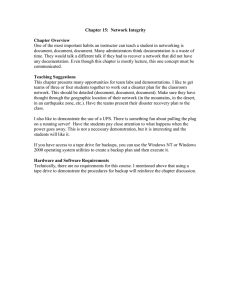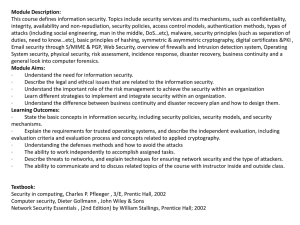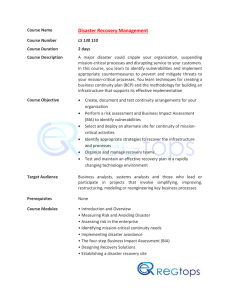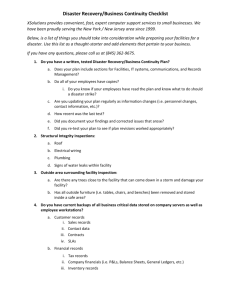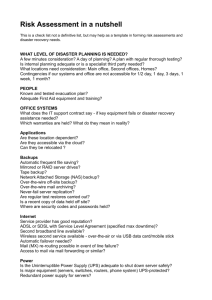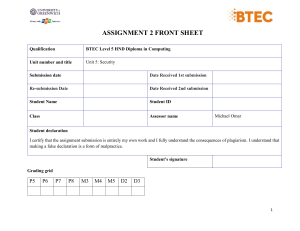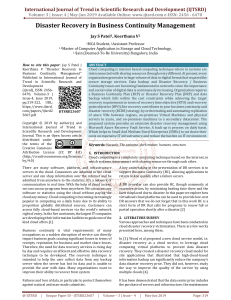Continuity Plan for Labs
advertisement
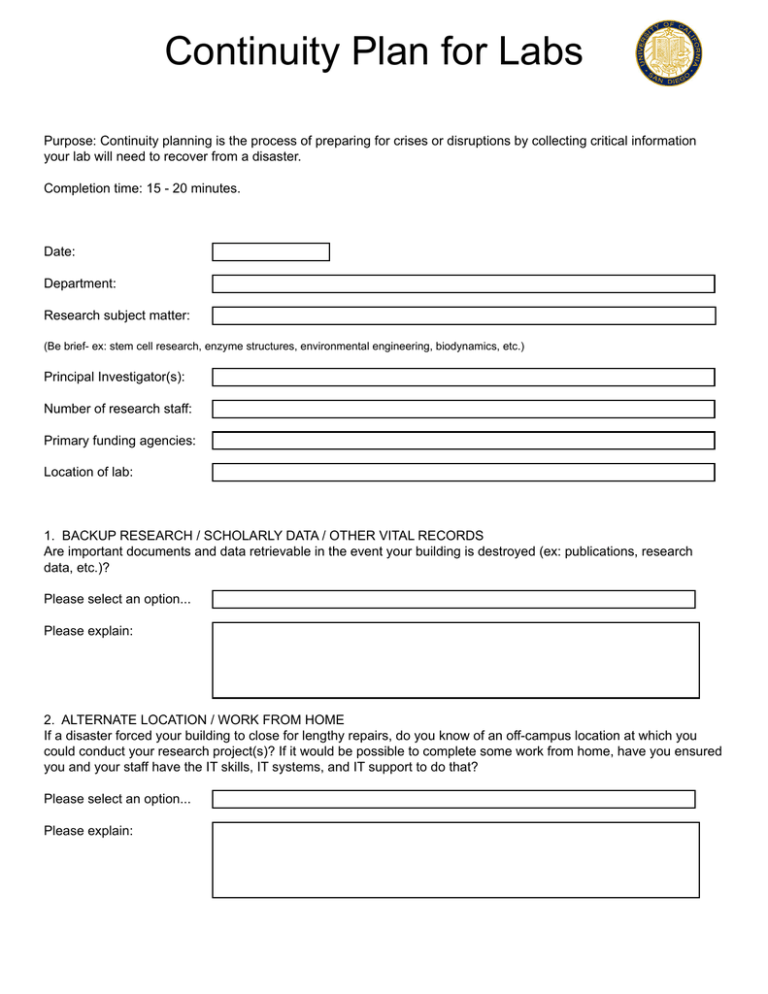
Continuity Plan for Labs Purpose: Continuity planning is the process of preparing for crises or disruptions by collecting critical information your lab will need to recover from a disaster. Completion time: 15 - 20 minutes. Date: Department: Research subject matter: (Be brief- ex: stem cell research, enzyme structures, environmental engineering, biodynamics, etc.) Principal Investigator(s): Number of research staff: Primary funding agencies: Location of lab: 1. BACKUP RESEARCH / SCHOLARLY DATA / OTHER VITAL RECORDS Are important documents and data retrievable in the event your building is destroyed (ex: publications, research data, etc.)? Please select an option... Please explain: 2. ALTERNATE LOCATION / WORK FROM HOME If a disaster forced your building to close for lengthy repairs, do you know of an off-campus location at which you could conduct your research project(s)? If it would be possible to complete some work from home, have you ensured you and your staff have the IT skills, IT systems, and IT support to do that? Please select an option... Please explain: 3. ANIMAL NEEDS Research animals typically require a controlled environment, special equipment, food, and trained staff – any of which could be impacted by a disaster event. For some departments, care is placed in the hands of a central animal care department; for others, the responsibility falls to the principal investigators. Is there a plan in place for handling disruptive events? Please select an option... Please explain: 4. SPECIMEN BACKUP Are all of your hard-to-replace specimens or samples (biological, chemical, other) located in one building? If so, is it possible to replicate or distribute some to an alternate location? Please select an option... Please explain: 5. REFRIGERATION RISK The impact of freezer failure can be mitigated in various ways (ex: generator backup, knowledge of other freezers and equipment availability for transfer, etc.). Is your lab adequately protected against freezer failure? Please select an option... Please explain: 6. SPONSORS Sponsored projects have a special vulnerability to disruptive external events. Do your award documents specify procedures for requesting exceptions in the event of disruption (ex: deadline adjustments, budget adjustments, permission to temporarily re-purpose staff, etc.)? Please select an option... Please explain: 7. UTILITIES Please list all utilities needed in order for your lab to function (ex: bottled gases, refrigeration, etc.). Utilities needed: 8. EQUIPMENT Imagine that your lab is destroyed by fire. Do you have, safely stored outside of your lab, the records needed to support insurance claims (ex: model and serial numbers, purchase records, photos of equipment, videos of space, etc.)? Please select an option... Please explain: Please list equipment here, in order of criticality: Equipment needed: 9. BOLT-AND-BRACE FOR EARTHQUAKES Are the pieces of equipment and furniture in your lab adequately braced and bolted to minimize earthquake damage? Please select an option... Please explain: 10. EMERGENCY CONTACT INFORMATION Communication with faculty and staff following a disruptive event is extremely important. Is your lab's emergency contact list updated regularly, and in the hands of all who should have it? Please select an option... Please explain: 11. FALLBACK COMMUNICATION PLAN Have you planned how you will communicate with your staff and department if phones and/or web are down? Please select an option... Please explain: 12. PURCHASING If the data network or the financial system is down, do you have a way to make purchases? Please select an option... Please explain: 13. SUPPLIES Some research projects have important supplies (consumables) whose stock-on-hand needs to be adequate in case the supply chain gets interrupted. If this applies to any of your projects, do you keep a one-month supply stock at all times? Please select an option... Please explain: 14. KNOWLEDGE / SKILLS Research teams may include persons (postdocs, grad students, or staff) with unique knowledge or skills, whose absence would cause grave difficulty for the project. Have you done what you can to mitigate that risk (ex: crosstraining, sharing of knowledge, diligent documentation, etc.)? Please select an option... Please explain: Please send back to Sara Velarde, the campus continuity planner, when completed: s1velarde@ucsd.edu Sara is also the contact person if you have any questions about this form, or would like more information on lab preparedness. Thank you for your timely completion and return!
